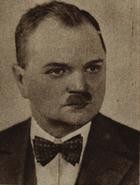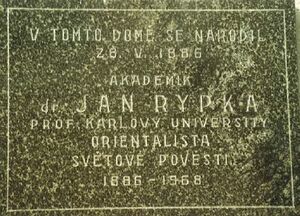يان رپكا
يان ريپكا | |
|---|---|
Jan Rypka | |
 | |
| وُلِدَ | 28 مايو 1886 |
| توفي | 29 ديسمبر 1968 (aged 82) |
| الجنسية | تشيكي |
| الجنسية | تشيكي |
| الخلفية الأكاديمية | |
| الجامعة الأم | جامعة ڤيينا |
| العمل الأكاديمي | |
| المجال | الدراسات الشرقية |
| المجال الفرعي | |
| المؤسسة | جامعة كارلوڤا |
| التوقيع | |
 | |
يان رپكا Jan Rypka (عاش 28 مايو 1886، كومنيريش – 29 ديسمبر 1968، پراگ) هو مستشرق تشيكي، وأستاذ علم الإيرانيات وعلم التركيات في جامعة كارلوڤا، پراگ.
Jan Rypka was a participant in Ferdowsi Millenary Celebration في طهران in 1934.[1]
النشأة
Rypka's father owned a small business. As a child he was given the ألف ليلة وليلة. He described the book's effect on his life as breathing "mysterious forces there." After completing his schooling he enrolled at the جامعة ڤيينا.[2] He graduated in Oriental studies. Then in 1910 he obtained a Doctor of Philosophy in Islamic languages.[3]
After graduation Rypka set up a small business of translating Oriental texts. However, he soon left the business because he found a better job, even if not so closely related to his orientalist background, as he was appointed at the Viennese court and university printing office. Rypka moved to Prague following the establishment of the independent Czechoslovak state. There he devoted himself fully to Oriental studies. He also joined the civil service for a short time. In April 1921, he found work as a librarian. That same summer, he was granted a sabbatical leave to travel to Constantinople. Rypka stayed in Constantinople for nearly a year and a half. In that ancient city he found ample opportunities to know and understand the Orient close up, an experience he put in the book he wrote about his stay in Turkey.[3]
العودة من اسطنبول
Rypka once again began work at the Ministry of Education after returning from Constantinople. He began working on Turkish poetry, analyzing the works of such poets as Sabit and Bâkî. Beginning in the 1930s, Rypka moved his focus to Persian poetry. The central figure in his research was the Persian poet Nizami. Another of his key subjects was the medieval poet Ferdowsi. In the fall of 1934 Rypka was invited by the Iranian government to attend the celebrations of the 1000th anniversary of Ferdous' birth. He ended up spending a full year in Iran, doing academic research. He wrote about his year in Iran in the popular book Iranian Pilgrim.[1]
المعهد الشرقي
Rypka was the driving force behind the establishment of the Oriental Institute, of which he was one of the earliest members.[4] He contributed to the institute's development, contributing not only as a journalist but as an adviser and patron in its incipient stages. He is even credited with naming the institute's archives, the Archive Oriental.[3]
أعماله
له «تاريخ الأدب الفارسي» من الفتح الإسلامي حتى نهاية القرن التاسع عشر. وقد ظهر باللغة التشيكية وباللغة الألمانية والإنجليزية.[5]
شارك في الاحتفال بألفية الفردوسي في طهران عام 1934.
المصادر
- ^ أ ب Naše řeč no. 1, vol. 32 (1948) (بالتشيكية)
- ^ www.libri.cz (Czech)
- ^ أ ب ت "Jan Rypka". Academy of Sciences. Retrieved 10 September 2013. (Czech)
- ^ "www.orient.cas.cz (Czech)". Archived from the original on 9 August 2020. Retrieved 1 November 2015.
- ^ رپكا موسوعة المستشرقين للدكتور عبد الرحمن بدوي، 1992
